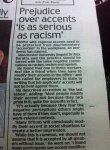My increasing deafness, and no longer working or speaking to be heard in public, meant that I rather lost the ability to hear where my voice was pitched.
I am naturally quietly spoken, but I had learned to 'speak out'. It reached the stage that I was almost silent, and I was sent to see a speech therapist.....who rapidly discovered that I had three languages

Local clearly spoken Scots of the old variety, not the Glaswegian kind. Politely spoken English with a Scottish accent, and 'received pronunciation' that's still there from my childhood education and my WRAF officer Mother's intent that I would learn to speak
properly.
In none of those does Th become f.
In the first one the glottal stop does come out, as well as skipped vowels. "Y'see", instead of, "You see", and the classic, "Thoucht", instead of the crisply hard t in, "Thought", or the deeper vowel of the RP.
This cannot be uncommon, right across the country local accents and speech gives way to a clearer English when meeting others from outwith our own locality.
At the end of the day so long as we are mutually comprehensible, it keeps it interesting

I love hearing regional accents, even if nowadays they're a real struggle.
I do like the quote about English (language) lurking in dark alleys to beat up other languages and rifle through their pockets for spare vocabulary

I think the original James Nicol quote is maybe not quite pc enough for here.

 laughingsquid.com
laughingsquid.com



